|
Can Mozart's Così fan tutte be modernized? The answer is no, not if you don't want to lose most of its seductive charm. The story of innocence betrayed turns absurd in our post-modern, "woke" era where elementary school kids watch porn on their smart phones. Two young guys plotting a partner swop in disguise in order to test the fidelity of their fiancées? Laughable. But two hundred and thirty years ago, when Mozart and his librettist Da Ponte proposed the story, it created a scandal. Well-bred young women like the sisters Fiordiligi and Dorabella knew nothing about men and sex; nothing about the misogyny of the society they lived in. Their cavaliers, Guglielmo and Ferrando, were still romantic enough to believe in the unshakable devotion of their "goddessses." So they eagerly enter a bet against an older cynic, Don Alfonso, who claims a faithful woman doesn't exist. Don Alfonso devises the plot to prove his point and, with the help of the devious maid Despina, destroy their illusions.
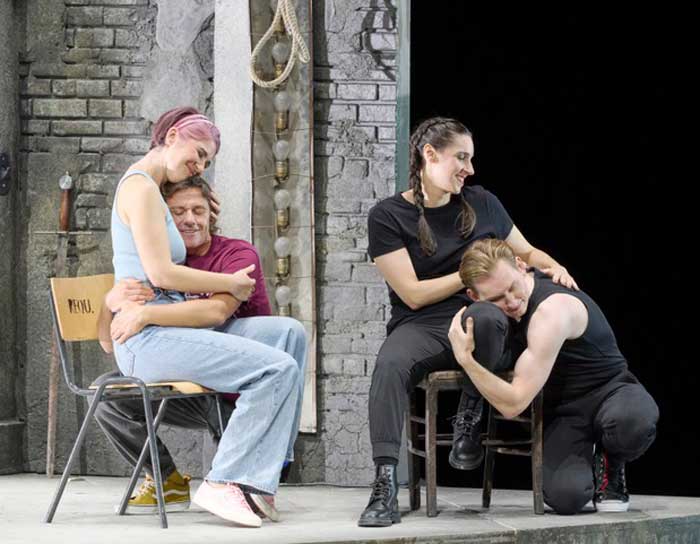
In Barry Kosky's production for the Wiener Staatsoper
(premiered last summer and given in a new cast this fall) the
acclaimed director unfortunately went for a contemporary setting.
Moreover, he added another layer of alienation with the trope of
theater within the theater: the characters are rehearsing Cosí at a
run-down provincial opera house. Don Alfonso is the director and
Despina the stage manager, deftly wielding a vacuum cleaner. But
Don Alfonso, sung without much conviction by Italian baritone
Luca Pisaroni, is already the puppet master in Mozart's story, so
this doubling up adds nothing of interest. The fact that the
modern youngsters are engaged in love affairs with each other
only adds confusion and doesn't work. Kosky, perhaps having
realized the failure, drops the gratuitous complication after act I,
but the damage is done: as all the players know they are only play
-acting, there is zero suspense and the emotional charge of the
story falls flat like a cold soufflé.
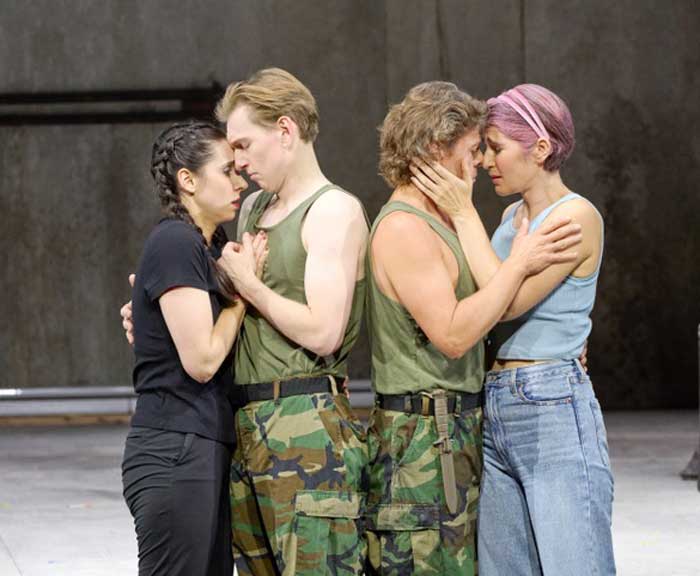
The production was not helped by the Staatsoper Orchestra's
ponderous tempi, drawn-out recitativi and several sluggish arias
under Hungarian conductor Adam Fischer. The saving grace were
the beautiful voices of the singers: Promising Australian soprano
Nicole Car as Fiordiligi, Italian mezzo Cecilia Molinari as
Dorabella, and Austrian baritone Markus Werba as Guglielmo. As
Despina, Russian soprano Maria Nazarova had the vocal and
comedic chops of a coming star. As Ferrando, honey-voiced
Ukrainian tenor Bogdan Volkov, a talent on a fast rise, surprised
with his relaxed physical ease and obvious relish in the comic
antics of the role.
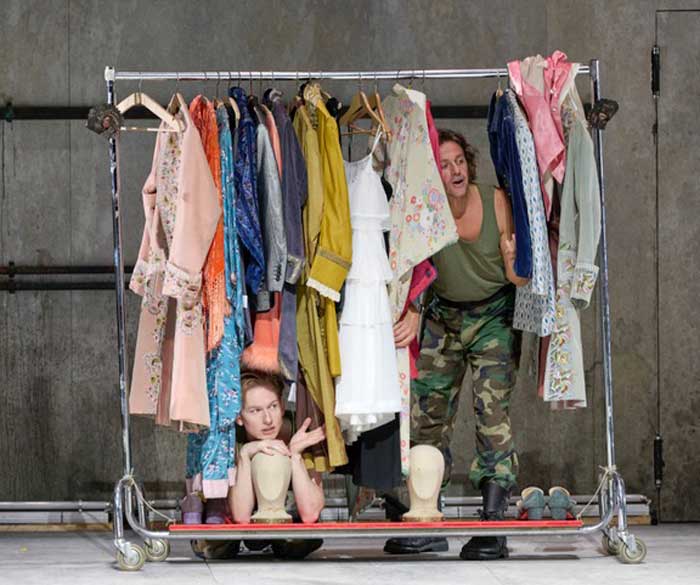
But Kosky being Kosky,* one of Europe's most sought-after
directors, he came up with a few note-worthy ideas. To begin
with, the whole crew is in rehearsal clothes, Jeans and T-shirts,
but when the men storm the citadel of the women in disguise,
they wear 18th century costumes and masks. This instantly brings
back a whiff of Mozart's erotic spice and gains momentum in Act
II, when the women follow suit with crinoline dresses, wigs and
painted faces.
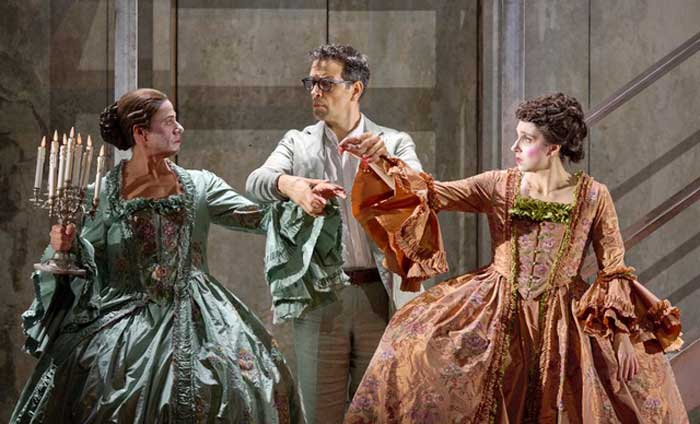
When the couples are ready for their first amorous rendezvous, in
Act II, Guglielmo and Ferrando dress up like mirror images of the
sisters: they appear in identical Rococo gowns, wigs and makeup.
The rehearsal stage (designed by Gianluca Fallaschi) has turned
around, showing its back with scaffolding and fire-stairs at each
corner. The action turns back into an 18th century masquerade.
It's a marvel to to see both men mount and descend the zig-zag of
the stairs in their crinoline dresses, moving with such feminine
allure that the illusion lasts until they sing. In a suspenseless
staging, this cross-dressing episode is arresting. What is going on?
Is it a "wolf in sheepskin" maneuver by the men to soothe sexual
anxieties in the women? Or is Kosky telling us that Guglielmo and
Ferrando have a better chance with their seduction if they adopt a
few feminine graces?
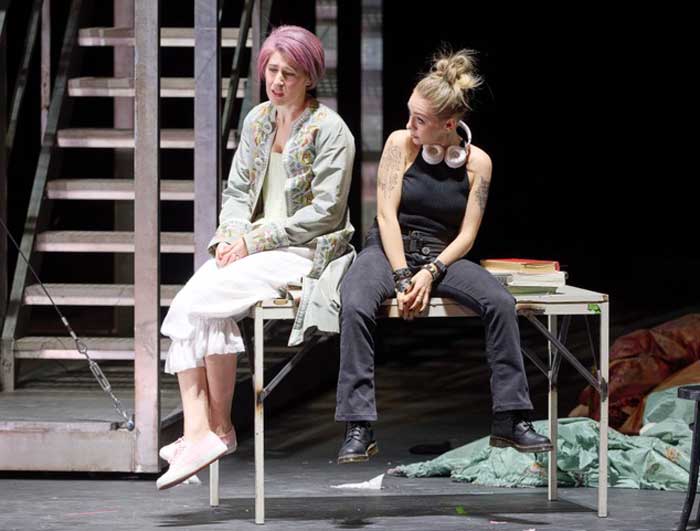
Whatever the answer, the skirts soon come off, leaving the four
lovers in their corseted underwear. In spite of the progress in
their campaign, the men seem oddly vulnerable in their feminized
d√©shabill√©s. This unexpected wardrobe—quite unfit for male
conquerers—has an intriguing effect. It brings out more sharply
than usual productions of Cosí that the young men are more
undone, more regretful than the women over losing their illusions
and their bet. They are back in masculine suits for their mock
marriage, looking morose behind dark sun glasses. When the
truth is revealed, Fiordiligi and Dorabella have enjoyed two
fiancés in a single day and their guilt is attenuated by having been
fooled on purpose.
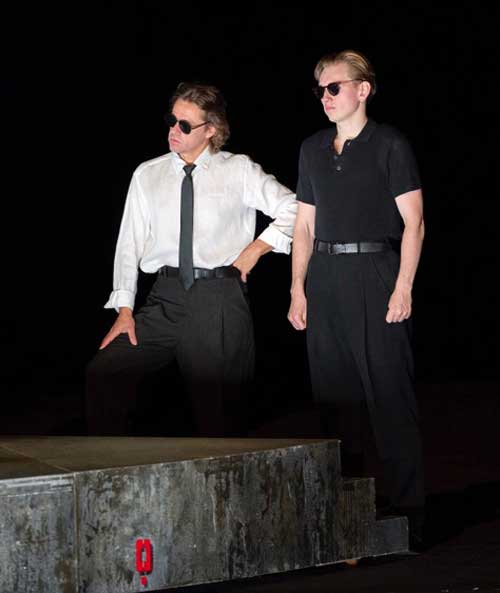
So, who chooses whom in the end? Kosky's modern couples show
discontent like kids in a tantrum. They throw their scores to the
floor or on their director's desk, then grab their bags and strut off
in four different directions.
*Kosky's production of Verdi's Macbeth was reviewed here last
month.
Vienna States Opera Ballet: Swan Lake
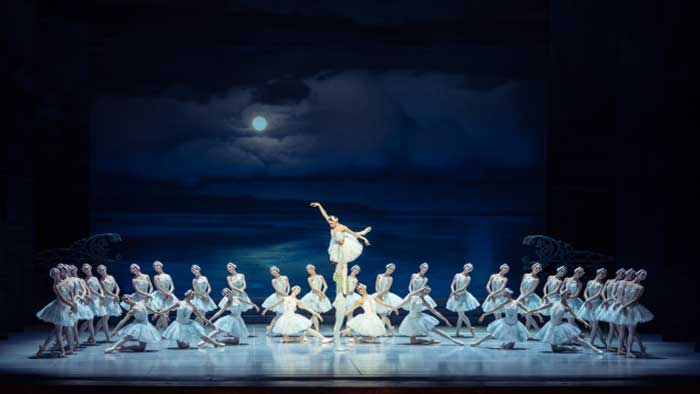
Another story of love and betrayal: The Wiener Staatsoper Ballett
made a decent impression in Nureyev's version of Swan Lake.
The young-looking, eager company was charming in the many
divertissements and showed cohesion in the corps of thirty-two
swans, although the pretty swan maidens accompanied
Tchaikovsky's romantic music with an unusually loud staccato clop-clop of their pointe shoes (a problem the soloists avoided).
I hadn't seen Nureyev's Vienna version from 1964 in a while and
once again relished the changes he made to the original Bolshoi
choreography by Petipa/Ivanov -- a version that is still used more
often than one would imagine. Nureyev's intelligent remodel
allows Prince Siegfried (one of his most acclaimed roles) to
participate in the (otherwise endless) court dances of his birthday
celebration in Act I. The welcome expansion stretches throughout
the ballet. After extended bravura numbers with the Black Swan,
Odile, in Act III, the Prince mistakes the demonic double for his
Swan Queen, Odette. Swearing eternal love to the wrong woman,
he has betrayed and lost her. He succumbs to the sorcerer
Rothbart (Soloist Eno Peci), who forces Odile to swim away as a
swan. Desperate to follow her, the Prince drowns in the stormy
waters of the lake.
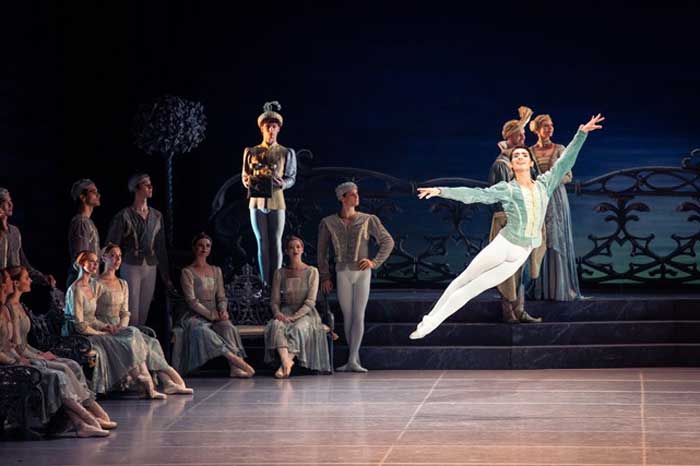
Prince Siegfried was nicely danced by American soloist Timoor
Afshar in his role debut, a young danseur noble with clean,
beautiful lines. His leaps and pirouettes remained in a safe zone,
however, and so did his expression of romantic passion — a far
cry from the fiery charisma Nureyev (and many dancers
afterwards) displayed in the role.
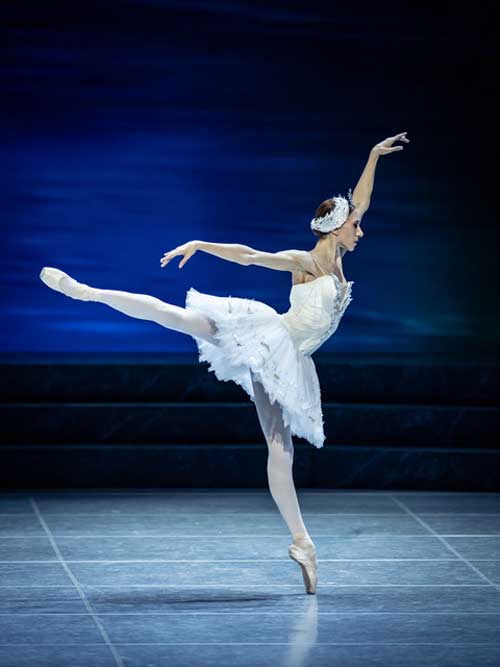
The Swan Queen, danced by Cypriot soloist Ioanna Avraam, had a
lovely seriousness in her white incarnation, but her thin and
somewhat edgy arms did not quite achieve the softness of swans
down. As the Black Swan, she managed the technical difficulties
with aplomb, but failed in her characterization. Instead of adding
devious twists to her movements and seductive malice to her
acting, she expressed her evil intentions with a snarky, toothy
grin. This grin remained frozen on her face throughout the act—
even during the tricky thirty-two fouettés (one-leg turns on
pointe). Whoever advised or forced her into this grimace
confused the black magic of the fairy tale with a Punch-and-Judy
show for kids.
The Vienna Swan Lake was what one expects from most
established companies who rotate their newly appointed soloists
through roles that are still a step beyond them. It's a dilemma as
the next generation needs the experience and challenge of
demanding parts. There seems to be a wide-spread belief that
sufficient technical prowess does the trick. But "underbaked"
artists don't satisfy. A lot more could be achieved if teachers and
directors encouraged and rewarded character development,
personality and artistry in their dancers—in short, if they went for
the "full bake."
Photo credits: Wiener Staatsoper Michael Pohn
Wiener Staatsoper Ballett Ashley Taylor
|